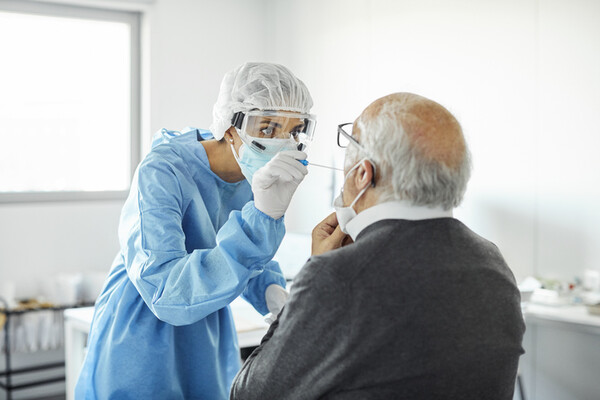Korea is experiencing its most severe influenza outbreak in eight years, with emergency rooms and intensive care units across the country facing unprecedented pressure. The surge comes at a particularly challenging time, as hospitals continue to struggle with staffing shortages following last year's trainee doctor walkout, leaving many facilities without enough staff to manage the influx of severe cases.

According to the Korea Disease Control and Prevention Agency (KDCA), influenza-like illness cases have reached a concerning 78.9 per 1,000 people in the fourth week of December – the highest level since 2016.
This marks a sharp rise of over 10 additional cases per 1,000 people since early December, pushing both local clinics and major university hospitals to their operational limits.
The current crisis echoes pre-Covid-19 seasonal patterns but with added complications. While hospitals regularly dealt with influenza surges before the pandemic, the ongoing shortage of medical residents – a lingering effect of last year's medical crisis – has severely impacted their ability to manage patient volumes.
This situation is further complicated by recent government initiatives to reduce bed capacity in tertiary hospitals as part of structural reform pilot projects, raising concerns about the healthcare system's ability to accommodate rising hospitalization rates.
Against this backdrop, a heated debate has emerged over making influenza self-test kits available to the general public, similar to Covid-19 home testing devices.
The discussion has intensified as patients face long wait times and significant out-of-pocket expenses for influenza testing at medical facilities.
The issue gained prominence during a recent National Assembly Health and Welfare Committee meeting on Tuesday when Rep. Ahn Sang-hoon of the ruling People Power Party shared his firsthand experience with the current testing system. "I waited two hours for an influenza test and paid 30,000 won ($20.54) as an uninsured service," Ahn recounted.
Drawing a parallel to Covid-19 testing, he questioned, "Covid-19 self-test kits cost around 3,000 won, and shouldn't we allow the public to use influenza self-test kits at a similar price so they can quickly self-isolate?"
However, government health officials express significant reservations.
Minister of the Ministry of Food and Drug Safety (MFDS) Oh Yu-kyoung pointed to technical challenges that distinguish influenza testing from Covid-19 testing.
"While Covid-19 self-test kits only require a nasal swab, current professional influenza kits require deep nasopharyngeal specimens," Oh said.
She warned that improper specimen collection could lead to false negatives, potentially causing patients to miss critical treatment windows.
KDCA Commissioner Jee Young-mee aligned with this cautious approach, stating that "long-term consideration is needed" and promising to "determine future directions through discussions with the MFDS and relevant experts."
The current regulatory framework presents its own complexities. Under existing medical device laws, while influenza diagnostic kits are designated for professional use and can only be ordered by hospitals or medical device vendors, there are no strict restrictions preventing their sale to the general public.
Medical experts offer nuanced perspectives on the debate.
Professor Chung Jae-hoon of the Department of Preventive Medicine at Gacheon University College of Medicine acknowledged the challenges while seeing potential value in-home testing.
"The public's ability to collect proper specimens falls below that of medical professionals, and specimen quality directly determines diagnostic accuracy,” Chung told Korea Biomedical Review. “Also, with multiple manufacturers, test result consistency could vary and it is important to note that there are no approved influenza self-test kits.”
However, given that influenza is such a prevalent infectious disease with high infection rates, Chung stressed that he believes that if such a kit is developed that can have some utility, despite their limitations.
Professor Lee Hyuk-min of the Department of Laboratory Medicine at Severance Hospital provides a detailed analysis based on Covid-19 experiences.
"The utility of self-test kits varies depending on their intended purpose,” he said. “If we're aiming to prevent transmission and manage the disease, self-test kits are clearly insufficient.”
Recent findings suggest asymptomatic influenza infections exist, and rapid tests show lower sensitivity when antigen levels are low, he added.
Lee particularly emphasizes the critical timing of treatment.
"If the purpose is to diagnose symptomatic patients and prescribe medication, rapid tests can be useful,” he said. “However, influenza patients still require a hospital visit if they want to receive medications.”
Antiviral medications for influenza are quite expensive, and like antibiotics, they must be taken according to a precise schedule to prevent antiviral resistance and this requires proper medical guidance, Lee added.
He also cautioned against potential treatment delays.
"What's crucial is that antiviral medications must be administered within 48 hours of symptom onset,” he said. “Their effectiveness diminishes significantly after this window and if people rely on potentially inaccurate self-testing, they might miss this crucial treatment window."
Addressing infection control concerns within hospitals, Lee noted that while there are concerns about disease transmission in medical facilities, Korea has learned from Covid-19 that proper mask-wearing and healthcare facility infection control measures can help manage this risk and urged influenza patients to visit hospitals for proper test and treatment.
“Influenza isn't like a common cold that can be treated with just fever reducers – it requires comprehensive medical care,” Lee said.

